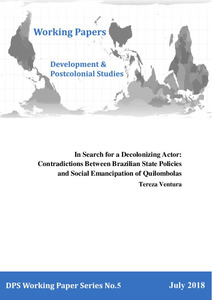In Search for a Decolonizing Actor: Contradictions Between Brazilian State Policies and Social Emancipation of Quilombolas
| dc.contributor.editor | Bendix, Daniel | |
| dc.contributor.editor | Brämer, Josephine | |
| dc.contributor.editor | Ziai, Aram | |
| dc.date.accessioned | 2023-11-27T14:07:52Z | |
| dc.date.available | 2023-11-27T14:07:52Z | |
| dc.date.issued | 2018 | |
| dc.identifier | doi:10.17170/kobra-202311249078 | |
| dc.identifier.uri | http://hdl.handle.net/123456789/15220 | |
| dc.language.iso | eng | |
| dc.rights | Namensnennung - Weitergabe unter gleichen Bedingungen 4.0 International | * |
| dc.rights.uri | http://creativecommons.org/licenses/by-sa/4.0/ | * |
| dc.subject | coloniality | eng |
| dc.subject | Quilombo | eng |
| dc.subject | decolonial theory | eng |
| dc.subject | race and identity rights | eng |
| dc.subject | public policies | eng |
| dc.subject.ddc | 300 | |
| dc.title | In Search for a Decolonizing Actor: Contradictions Between Brazilian State Policies and Social Emancipation of Quilombolas | eng |
| dc.type | Working paper | |
| dcterms.abstract | This paper explores the articulations between the present social struggles of Quilombolas (Maroons’ descendants of those who escaped enslavement), state policies, coloniality and global inequality. Two case studies illustrate how the infiltration of global mining and overexploitation of eucalyptus have diminished natural resources in the region and encroached upon the land rights of black communities. This paper first provides a comprehensive review of the policy changes that paved the way for the recognition of the land ownership rights of Quilombolas and displays how public policies have raised complex issues about the relationship between the Quilombolas’ status as democratic citizens as well as an ethnic community. Bringing a decolonial theoretical perspective, the paper presents the Quilombolas’ potential role of resistance in impacting the expansion of extractive global economy. Quilombolas’ case shows that the political economic connection between Latin American territories and the operative rationality of transnational capitalism. This linkage can also be interpreted along the lines of the global coloniality theoretical perspective. The critical perspective of global coloniality from Quijano, Grosfoguel and Hall is employed in order to analyze the Quilombolas’ political and social conditions to move beyond the narrow space between the recognition of their ethnicity and their history of slavery. However, in order to face global injustice, and its hidden face – coloniality – the Quilombolas would need to redefine themselves as global actors against the corporate-driven global economy. This political opportunity also calls for the constitution of other forms of relationships between African descendants, the Brazilian state and global economy in order to reinvent themselves within a decolonized democracy. | eng |
| dcterms.accessRights | open access | |
| dcterms.creator | Ventura, Tereza | |
| dc.contributor.corporatename | Kassel, Universität Kassel, Fachbereich Gesellschaftswissenschaften | ger |
| dc.subject.swd | Brasilien | ger |
| dc.subject.swd | República dos Palmares | ger |
| dc.subject.swd | Entkolonialisierung | ger |
| dc.subject.swd | Polizei | ger |
| dc.subject.swd | Quilombo <Geschichte> | ger |
| dc.type.version | publishedVersion | |
| dcterms.source.series | DPS Working Paper Series | eng |
| dcterms.source.volume | No. 5/2018 | |
| kup.iskup | false |
Dateien zu dieser Ressource
Das Dokument erscheint in:
-
DPS Working Paper [17]


